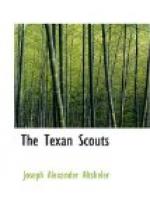He drank of the water, rested a while, and then began a search of the oaks. He was looking for squirrels, which he knew abounded in these trees, and, after much slow and painful walking, he shot a fine fat one among the boughs. Then followed the yet more mighty task of kindling a fire with sticks and tinder, but just when he was completely exhausted, and felt that he must fail, the spark leaped up, set fire to the white ash that he had scraped with his knife, and in a minute later a good fire was blazing.
He cooked the tenderest parts of the squirrel and ate, still forcing his appetite. Then he carefully put out the fire and went a mile further up the creek. He felt stronger, but he knew that he was not yet in any condition for a long journey. He was most intent now upon guarding against a return of the chill. It was not the right time for one to be ill. Again he sought a place in a thicket, like an animal going to its den, and, wrapping himself tightly in the blankets, lay down.
He watched with anxiety for the first shiver of the dreaded chill. Once or twice imagination made him feel sure that it had come, but it always passed quickly. His body remained warm, and, while he was still watching for the chill, he fell asleep, and slept soundly all through the night.
The break of day aroused him. He felt strong and well, and he was in a pleasant glow, because he knew now that the chill would not come. It had been due to overtaxed nerves, and there was no malaria in his system.
He hunted again among the big trees until he found a squirrel on one of the high boughs. He fired at it and missed. He found another soon and killed it at the first shot. But the miss had been a grave matter. He had only four bullets left. He took them out and looked at them, little shining pellets of lead. His life depended upon these four, and he must not miss again.
It took him an hour to start his fire, and he ate only half of the squirrel, putting the remainder into his bullet pouch for future needs. Then, much invigorated, he resumed his vague journey. But he was compelled very soon to go slowly and with the utmost caution. There were even times when he had to stop and hide. Mexican cavalry appeared upon the prairies, first in small groups and then in a detachment of about three hundred. Their course and Ned’s was the same, and he knew then that he was going in the right direction. Fannin was surely somewhere ahead.
But it was most troublesome traveling for Ned. If they saw him they could easily ride him down, and what chance would he have with only four bullets in his pouch? Or rather, what chance would he have if the pouch contained a hundred?
The only thing that favored him was the creek which ran in the way that he wanted to go. He kept in the timber that lined its banks, and, so long as he had this refuge, he felt comparatively safe, since the Mexicans, obviously, were not looking for him. Yet they often came perilously near. Once, a large band rode down to the creek to water their horses, when Ned was not fifty feet distant. He instantly lay flat among some bushes, and did not move. He could hear the horses blowing the water back with their noses, as they drank.




